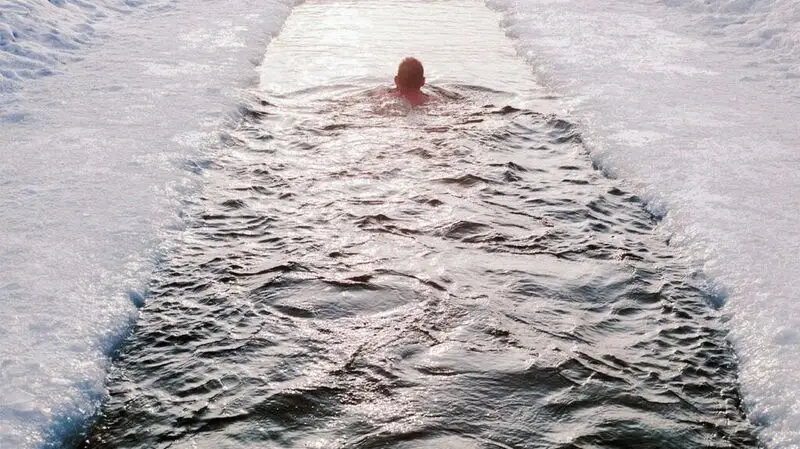
- Research is ongoing about the potential health benefits of cold-water immersion, which involves taking cold showers or ice baths.
- One systematic review and meta-analysis found that cold-water immersion may help decrease sick day absences, improve sleep and quality of life, and reduce stress.
- More research is needed to examine the long-term benefits of cold-water immersion.
A recent
According to the findings, people who use cold-water immersion may experience stress reduction for a limited time after exposure, have a decrease in sickness absences, and experience improvements in quality of life and sleep.
The review authors encourage future research to look at the cold-water immersion’s long-term effects, include large and diverse samples, explore diverse outcomes, and examine dose-response relationships.
Cold-water immersion includes a broad range of actions that allow for exposure to cold water. Authors of the current review note that it has become more popular in recent years among athletes and the general population.
Dylan Colbert, PhD, a Performance Psychologist & Lecturer at Carlow College, who was not involved in the study, told Medical News Today that despite there being a lack of consensus on what conditions are necessary for optimal cold immersion, there are three main factors.
“Firstly, the ideal water temperature appears to be between 10 and 15 degrees Celsius. While many practitioners use water considerably colder, the additional physiological and/or psychological benefits of this have yet to be demonstrated empirically. Secondly, it is advisable to submerge only up to neck level, as dunking one’s head has been associated with some adverse health consequences, and may even undermine some of the positive effects of CWI. Finally, while short sessions are of benefit, research has indicated an optimal CWI duration of approximately 12 minutes for experienced practitioners,” Colbert explained.
For this review and analysis, the authors defined cold-water immersion as showering, ice baths, or immersion in cold water that was 15 degrees Celsius or less for 30 seconds or more.
They only included studies with cold water immersion to chest level or higher and excluded studies where participants wore protective clothing. Ten of the studies involved bath cold-water immersion, and one involved cold showers.
The authors of the current review wanted to understand more about the effects of cold-water immersion. They used ten databases to search for eligible randomized controlled trials. They assessed methodological quality based on components like between-group comparison, blinding, and adequate follow-up. Seven studies were of moderate quality, and four were of high quality.
The researchers looked at a number of outcomes related to cold-water immersion including sleep quality, stress, mood, and immunity. They conducted meta-analyses when two or more studies reported on a cold-water immersion outcome. They conducted a narrative synthesis for outcomes that didn’t meet this and additional meta-analysis criteria. They were then able to conduct meta-analyses for inflammation, stress, and immunity.
For this paper, researchers included eleven studies, allowing them to examine information from 3,177 participants. Only one of the included studies had a group of mixed participants; all the other studies only included male participants.
The researchers excluded studies that included “highly-trained and elite athletes competing at a national level or higher.”
They found that cold-water immersion increased inflammation immediately and one hour after the intervention.
However, study author Tara Cain, the Project Manager for Dialling Up Health, Alliance for Research in Exercise, Nutrition & Activity (ARENA), Allied Health & Human Performance, University of South Australia, explained why this could still mean positive effects in the long-term.
“The body perceives cold as a stressor, activating an immune response that temporarily increases inflammation, much like how exercise causes short-term muscle damage before leading to strength gains. Over time, regular use of cold-water immersion may help reduce overall inflammation and support recovery, which is why it remains popular among athletes despite the initial inflammatory response.”
— Tara Cain, study author
Regarding other outcomes, researchers found that cold-water immersion helped reduce stress 12 hours after exposure but not immediately after, one hour after, 24 hours after, or two days after.
They did not find significant immunity changes immediately or one hour after cold water exposure. However, the certainty of evidence was fairly low.
Narrative syntheses revealed potential additional benefits of cold-water immersion. For example, one trial found that cold-water immersion reduced sickness absence by 29%. However, there wasn’t a significant difference between the number of illness days reported by the control and intervention groups.
This same trial also found an increase in quality of life for participants who engaged in cold-water immersion, but the change was no longer significant three months later.
Another trial found that cold-water immersion may improve sleep quality, but the intervention only lasted five days. Additionally, researchers did not find that cold-water immersion affected mood.
This review does have certain limitations. First, it focused on the effects of cold-water immersion in Healthy adults. Thus, the results may not be applicable to people with certain Health conditions or children.
Additionally, only one study included women, which limits how much of the findings can be applied to women. Many studies also had small sample sizes, which also limits generalizability.
Second, there was a lot of variation in the protocols that the trials used for cold water immersion, and this most likely added to the result heterogeneity.
Six of the eleven studies only looked at the impact of single immersions, which doesn’t allow for conclusions regarding the long-term impact of cold-water immersion. Five of the trials involved cold-water immersion after exercise, which introduces confounding risk.
Some outcomes were only reported by a single study, so the authors encourage caution regarding these results.
Each of the included trials had limitations. For example, researchers acknowledge a risk for confounding in the trial that assessed sleep quality. Similarly, the study evaluating the effects on sickness and quality of life relied on self-reporting, which introduces bias risk. This study also had struggles regarding cold-water immersion adherence over time.
The authors also point out that the effects of cold-water immersion seemed to be greatly dependent on time, so additional research regarding this factor may also be helpful. The authors note that future studies can also evaluate the safety of cold-water immersion and the participants’ experiences.
Overall, the results indicate the need for more research in this area to examine long-term effects and confirm effects related to various outcomes.
“Right now, there isn’t enough high-quality research to say exactly who benefits most or what the ideal approach is to cold-water immersion. More long-term studies, among more diverse populations, are needed to understand its lasting effects and practical applications,” Cain noted.
David Merrill, MD, PhD, a board-certified geriatric psychiatrist at Providence Saint John’s Health Center in Santa Monica, CA, and Singleton Endowed Chair in Integrative Brain Health, who was also not involved in the study, noted that long-term studies are needed to assess its full impact.
“Right now, cold plunging seems to have more immediate, short-term benefits. People report feeling more awake, less anxious, and even euphoric right after a plunge—likely due to the rush of endorphins and adrenaline.”
— David Merrill, MD, PhD
“The question is whether those effects translate into long-term improvements in mood and resilience. We need studies that track people over time to see if regular cold exposure has lasting mental health benefits, especially for those with clinical depression or anxiety,” he added.





